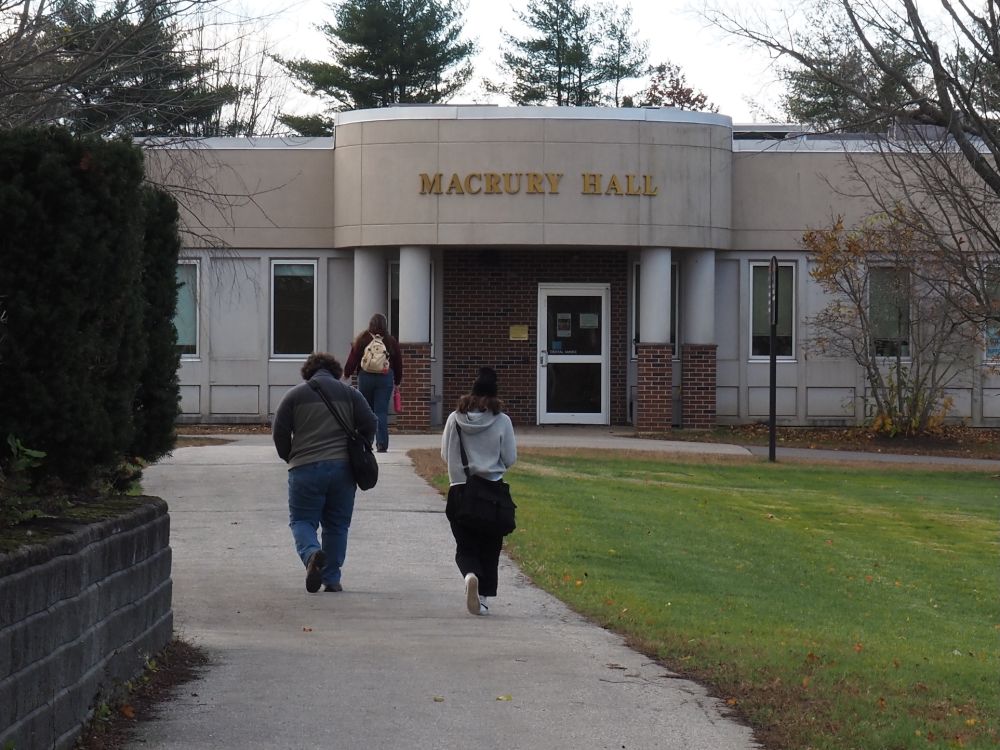
Students walk on campus at New Hampshire Technical Institute in Concord. NHTI is one of two New Hampshire community colleges that have a national accredited early childhood education program. (Photo by Maya Mitchell/New Hampshire Bulletin)
New Hampshire has a child care workforce shortage, and it is looking to its community colleges to address one part of that issue: the development pipeline. For Diana Menard, the department chair of education and child and family services at New Hampshire Technical Institute in Concord, the shift in early education happened almost a decade ago.
“Back in 2014 and 2015, we had really good numbers coming in out of high school students. We had two sections of courses during the day,” Menard said. “Now we have one section of day classes, and maybe it’ll have 10 to 15 students.”
The early childhood education sector often looks to high school and apprenticeship programs, such as Career and Technical Education, to help develop interest in the field. The goal is that after high school graduation, students will pursue accreditation through a higher education institution and begin their careers in early care and education.
CTE aims to prepare students for college and high-demand careers by providing them with “hands-on, career-focused programs” that combine learning and technical skills training, and are a huge contributor to the early childhood education workforce pipeline.
However, over the past decade, CTE programs have been reducing their early education options, largely because jobs in the industry tend to be low-paying. Today, around a quarter of the state’s CTE programs offer early childhood education training.
Menard said the cuts at the high school level have “depleted” community college programs, as fewer young people are being introduced into the industry.
The impact has been felt across the state. Between 2017 and 2024, the number of licensed providers in the Granite State able to care for children under the age of 5 has declined by nearly 13%, according to the New Hampshire Fiscal Policy Institute.
With the state’s aging population, unlivable wages, and the COVID-19 pandemic, which put further strain on the workforce, many providers have retired or left the field entirely.
New tuition assistance efforts
In an effort to reinvigorate that pipeline, the Community College System of New Hampshire has expanded its tuition assistance program for students pursuing early childhood education.
The Early Childhood Tuition Assistance program now covers community college tuition, fees, and books for approved courses as students pursue a certificate or associate’s degree in early care and education. In the previous version of the program, ECE students were eligible just for tuition assistance and only for one course per semester.
The state allocated $2.5 million last budget cycle for the program. Teri LaFlamme, college access program coordinator for CCSNH, said the program has given students the financial freedom to explore the field.
“[The funding] has opened up the door for a lot of expansion,” LaFlamme said. “Before, the students typically were only able to take one class, and they were living paycheck to paycheck. … I think it’ll be a clearer path for students.”
According to LaFlamme, the assistance program has covered the cost for 1,200 courses and awards were given to over 643 students. She said most students get coverage for all of their classes.
To qualify, students must be an ECE degree student, in good academic standing, and have applied to the Federal Assistance Student Financial Program. Students also need to either be a New Hampshire resident or employed by a New Hampshire child care program if they are not.
LaFlamme said very few students have been turned away from the program.
Expansive development efforts
High schools across the state have also partnered with community colleges to create an early college system. Students can take college classes at their high schools, online through a college faculty member, or at the community colleges themselves, and earn college credits. These credits are generally transferable to community or four-year colleges in New Hampshire or out-of-state.
Additionally, while all seven New Hampshire community colleges offer early care and education degrees or certificates, NHTI and Manchester Community College have recently been accredited by the National Association for the Education of Young Children.
Menard said the certification is a “quality seal” that proves students in the school’s programs demonstrate certain competencies. Through program accreditation, students will have an easier time transferring credits to a four-year college, specifically if that college is out of state.
Nashua Community College has also applied for accreditation, although the process has been put on hold due to the federal government shutdown.
“Better teachers help children be successful,” LaFlamme said. “That rollover effect, I really think that is great.”
This story was originally publishd by New Hampshire Bulletin and is being reorinted here under Creative Commons license CC BY-NC-ND 4.0. Click here to visit NH Bulletin and view their other stories.
